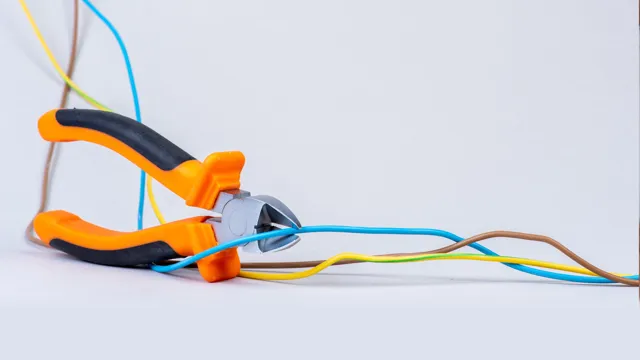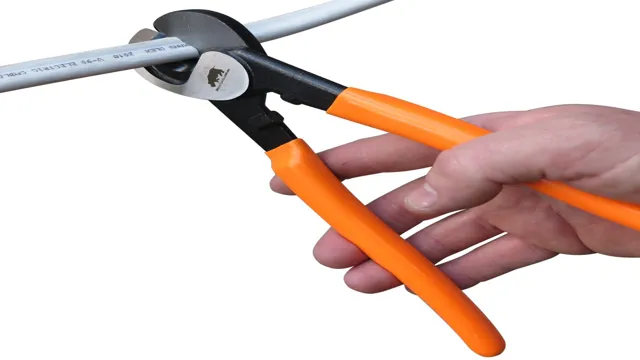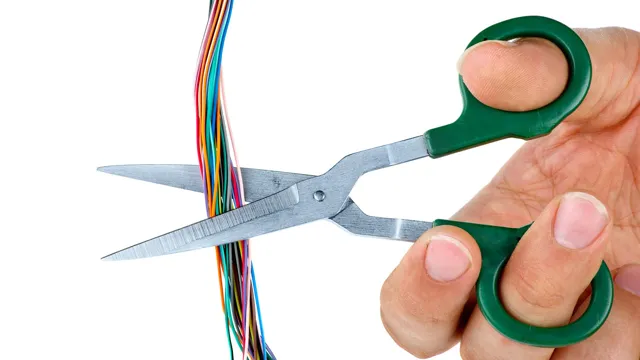What Can I Use Instead of Wire Cutters? 5 DIY Tools to Cut Wire Without Cutting Your Budget

Cutting wires can be a challenging task that requires precision and accuracy. While wire cutters are a common tool used for cutting through wires, there are actually various alternatives to wire cutters that can be just as effective. Whether you’re a DIY enthusiast or a professional electrician, finding the right tool that fits your needs is crucial.
In this article, we will explore some of the best alternatives to wire cutters and how they can be used. From scissors to bolt cutters, we have got you covered. So, let’s dive in and explore the world of wire-cutting tools!
Using Scissors
If you don’t have wire cutters handy, there are several items you can use instead, including scissors. While it may not be the most accurate tool, scissors can still get the job done in a pinch. To use scissors as a substitute for wire cutters, hold the wire with one hand and cut it with the blades of the scissors using your other hand.
It’s important to note that this may cause the blades of your scissors to become dull quickly. Additionally, scissors may not work well if you’re trying to cut thick or heavy-duty wire. In such cases, it’s best to invest in a good pair of wire cutters.
However, if you need to cut a thin piece of wire quickly, scissors can definitely help. Overall, while scissors can be used as a substitute for wire cutters, it’s important to keep their limitations in mind.
Pros and cons of using scissors for cutting wire
When it comes to cutting wire, scissors are a tempting option that many of us have tried. While they can get the job done, there are certainly pros and cons to consider. On the plus side, scissors are readily available in most households and can easily cut through thin wires.
However, attempting to cut thicker wires with scissors can be hazardous and damage the blades in the process. Additionally, using scissors for cutting wire can quickly dull the blades, making them less effective for their intended purpose. Overall, while scissors may be a quick fix in a pinch, it’s best to use wire cutters specifically designed for the task.
This will ensure cleaner cuts, safer handling, and greater longevity for both the tool and the wires being cut.

Using Pliers
If you don’t have wire cutters on hand, pliers can be a great alternative tool to use. While they may not be as precise as wire cutters, pliers can still get the job done. Needle-nose pliers are great at cutting through thinner wire, while larger cutting pliers can handle thicker wires.
To use pliers as a wire cutter, grip the wire between the blades of the pliers and apply pressure until the wire is cut through. It’s important to note that pliers may leave a rough edge or require more force to cut through the wire, so take extra care when working with delicate wires or cables. So, if you don’t have wire cutters on hand, don’t panic! Reach for your trusty pliers and get to work cutting those wires with ease.
Different types of pliers for wire cutting and their benefits
Pliers are a handy tool to have in any DIY kit, especially when it comes to wire cutting. There are several different types of pliers available for wire cutting, each with their unique benefits. One type of pliers is the diagonal cutting pliers, which are excellent for cutting wires close to their base or in tight spaces.
They have a pointed tip that allows for precision cuts and can cut through wires of various sizes. Another type is the lineman pliers, which are larger and sturdier than diagonal cutting pliers and can cut through thicker wires. They also have a gripping feature that makes it easier to twist or pull wires.
Needle-nose pliers, on the other hand, are great for intricate cuts and can reach tight spaces. They have a long, thin nose that can grab or hold onto small wires and can also bend wires into shape. It’s essential to choose the right pliers for the job to ensure efficient and safe wire cutting.
Using Shears
If you don’t have wire cutters on hand, there are other tools you can use instead to cut through wires with ease. One alternative is shears, especially those designed for cutting through electrical wires. While regular scissors may not be strong enough to handle the task, electrical shears have a specialized blade that can slice through copper, aluminum, and other types of wires effortlessly.
They usually have a comfortable grip for better control and precision. Keep in mind, however, that using shears to cut through extremely thick wires or cables might not be advisable. But for most household or DIY electrical projects, a reliable pair of shears could be a perfect substitute for wire cutters.
So, if you’re ever in a pinch without wire cutters, consider trying out shears as an alternative.
Pros and cons of using shears for wire cutting
When it comes to wire cutting, shears can be a useful tool for a variety of applications. One of the main benefits of using shears is their ability to quickly and easily cut through wires of different sizes. They are also relatively lightweight and easy to maneuver, which makes them a popular choice for those who need to cut wire in tight spaces.
However, there are also some potential downsides to using shears. For one, they may not be the best choice for cutting thick or heavy-duty wires, as they may struggle to make clean cuts. In addition, shears can sometimes leave sharp edges on the wire after cutting, which could be a safety hazard if not handled properly.
Ultimately, whether or not shears are the right choice for wire cutting will depend on the specific application at hand.
Using a Knife
When it comes to cutting wires, wire cutters are the obvious choice. However, there are times when you may not have wire cutters on hand and need to find an alternative tool. One useful option is a knife.
A sharp knife can easily slice through thin wires and cables, making it a great substitute for wire cutters in a pinch. When using a knife, it’s important to exercise caution and use a cutting board or other protective surface to avoid damaging the blade. Additionally, make sure to cut away from your body and keep your fingers well clear of the blade.
While a knife may not be the ideal tool for all wire cutting tasks, it’s a great backup option to keep in mind when you don’t have other tools available.
Precautions to take when using a knife as a wire cutter
When it comes to using a knife as a wire cutter, it’s important to take some precautions to avoid injury or damage. First and foremost, always make sure to use a sharp knife that can easily cut through the wire without slipping or forcing too hard. It’s also a good idea to wear gloves to protect your hands and fingers from cuts or scrapes.
Additionally, be careful not to cut through any other nearby wires or cables that could be damaged by the sharp blade. Finally, when finished with the job, make sure to clean and properly store your knife to keep it sharp and prevent any accidents in the future. By taking these simple precautions, you can use a knife as a wire cutter effectively and safely.
Conclusion
In conclusion, if you find yourself in a situation where wire cutters are not readily available, fear not! There are plenty of household items that can be repurposed. Grab a sturdy pair of scissors, a sharp knife, or even a nail clipper for those smaller wires. Remember, where there’s a wire, there’s a way!
FAQs
1. What are some alternatives to wire cutters? A: Some alternatives to wire cutters include scissors, pliers, craft knives, or even dental floss. 2. Can I use nail clippers instead of wire cutters? A: Yes, nail clippers can work as an alternative to wire cutters if you have a thin wire to cut. However, they may not be as effective for thicker wires. 3. Are there any household items that can substitute for wire cutters? A: Yes, you can use household items like kitchen shears, a sharp knife, or even a sturdy pair of scissors as long as they are capable of cutting wire. 4. Will a hacksaw blade work as an alternative to wire cutters? A: Yes, it can work, but make sure the blade is sharp and that you have good control over it to avoid unintended cuts. 5. Can I use a rotary tool like a Dremel instead of wire cutters? A: Yes, a rotary tool with a cutting disc can be used to cut through wires, but this method requires more precision and caution. 6. What if I don’t have any tools to cut wires with? A: In this case, you can try to strip the wire using a sharp blade, or you can try to break it by bending it back and forth until it snaps. 7. Is it safe to use a knife as a substitute for wire cutters? A: While it can be done, it’s important to exercise caution and wear protective gloves to prevent injury. It’s also best to only use a knife as a last resort.



